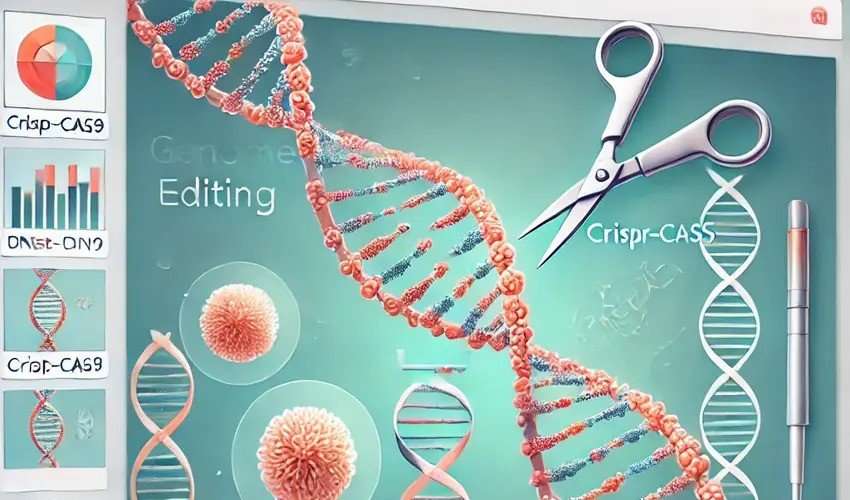From Genes to Solutions: How Genome Editing is Changing the World

Genome editing is one of the most transformative advances of the 21st century. This powerful technology allows scientists to change the DNA of living things. They can do so with great precision. It offers potential solutions to many of the world’s biggest problems. It will cure genetic diseases. It will improve farming. It will make sustainable biofuels. Genome editing is set to revolutionize many fields. This article covers the science behind genome editing. It also covers its uses, ethics, and its potential.
The Science Behind Genome Editing
Genome editing changes an organism’s DNA to achieve desired traits or outcomes. The most popular genome editing technology is CRISPR-Cas9. It stands for Clustered Regularly Interspaced Short Palindromic Repeats and CRISPR-associated protein 9. This method allows scientists to target specific DNA sequences and introduce precise changes.
CRISPR-Cas9 uses a guide RNA to direct the Cas9 enzyme to a specific location in the genome. Once there, Cas9 acts like molecular scissors, cutting the DNA at the targeted site. The cell’s repair mechanisms fix the cut, allowing for adding, removing, or changing genetic material. This technique is very efficient and versatile. It is a top tool for researchers worldwide.
Applications of Genome Editing
- Medicine:
- Genetic diseases are one promising use of genome editing. Conditions like cystic fibrosis, muscular dystrophy, and sickle cell anaemia are caused by specific genetic mutations, which genome editing can potentially correct. Scientists aim to target and repair the faulty genes responsible for these diseases, intending to provide permanent cures.
- Cancer Therapy: Genome editing is also being explored in cancer treatment. Researchers are modifying immune cells to improve their ability to recognize and attack cancer cells, which will help develop new immunotherapies. For example, CAR-T cell therapy involves editing patients’ T-cells to boost their ability to fight cancer.
- Agriculture:
- Genome editing offers huge potential for improving crops. It can boost yields, nutrition, and resistance to pests and diseases. Scientists can add traits to crops, including drought tolerance, faster growth, and better nutrition. This will address food security challenges and reduce the need for chemicals.
- Livestock: Like crops, genome editing can enhance livestock production. These traits include disease resistance, faster growth, and better meat quality. They can be added to animals, leading to more efficient and sustainable farming.
- Environmental Sustainability:
- Biofuels: Genome editing can be used to engineer microorganisms, producing biofuels more efficiently. By improving metabolic pathways, scientists can increase the yield of biofuels, including ethanol and biodiesel. They are a sustainable alternative to fossil fuels.
- Environmental Remediation: Genetically engineered organisms can also be used for environmental cleanup. For example, bacteria can be modified to break down pollutants and toxins. They do this in contaminated soil and water. This offers a biotech solution to pollution.
Ethical Considerations
Genome editing has huge benefits. But, it also raises big ethical concerns. These include:
- Germline editing means editing the genomes of human embryos. It can eliminate hereditary diseases. However, it also raises ethical questions. They are concerned with the long-term effects on future generations, consent, and the chance to create “designer babies” with chosen traits.
- Equity and access are key. But, the cost and complexity of genome editing may limit access to these advancements. This issue could worsen existing disparities in healthcare and agriculture. Ensuring equitable access to genome editing benefits is a critical consideration.
- Unintended Consequences: There is a risk of unintended genetic changes. These “off-target effects” could have unforeseen health or environmental impacts. Rigorous testing and regulation are essential to minimize these risks.
- Biodiversity: When introduced into the environment, GMOs could harm ecosystems and biodiversity. We must carefully evaluate the risk. Genetically edited organisms could outcompete or disrupt natural species.
The Future of Genome Editing
The future of genome editing holds great promise. Ongoing research and development aim to make it more precise, efficient, and useful. Here are some key areas of focus:
- Advanced Techniques: Scientists are constantly improving genome editing techniques to make them more accurate and reduce off-target effects. Newer methods, like base editing and prime editing, offer greater precision and modify DNA without causing double-strand breaks.
- Genome editing could play a significant role in regenerative medicine. It could enable the development of personalized therapies. By editing patient-derived cells, we’ve made tissues and organs for transplantation, which would reduce the need for donor organs.
- Global Food Security: The global population will reach 9.7 billion by 2050. Genome editing could be key to ensuring food security. We can meet the growing demand for food by making crops and livestock more challenging to climate change and more productive.
- Genome editing could aid conservation. It could be used to protect endangered species. Bringing back genetic diversity and disease resistance can help. It will boost threatened animal and plant populations. Scientists can do this.
- Ethical frameworks are crucial as technology advances. We need robust rules and guidelines. We need to engage with many kinds of stakeholders. These include ethicists, policymakers, and the public. Doing so will ensure that genome editing is used responsibly and fairly.
Conclusion
Genome editing is a powerful tool. It reshapes how we approach medicine, agriculture, the environment, and more. This technology could cure genetic diseases. It could improve crop yields and make sustainable biofuels. These benefits show its transformative power. However, it is vital to navigate the ethics and societal issues carefully. We must ensure that genome editing is used responsibly and benefits all people. Research and innovation continue to advance. Genome editing will be key. It will address many of the world’s top challenges. It will offer solutions once thought to be beyond our reach.
Zainab Afzal is a senior SEO Consultant and Writer. She has 5+ years of experience in Digital Marketing. After completing his degree in BS computer science, she has worked with different IT companies.




